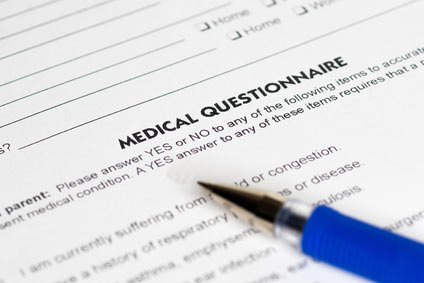Sleep Apnea Questionnaire
Online Questionnaire for Sleep Apnea

The sleep apnea questionnaire can help you determine if you need to be tested for sleep apnea in the sleep center.
Why do you need to take a sleep questionnaire?
Are you in the same situation?
In many sleep apnea questionnaires, you will encounter different terms which describes symptoms, causes and side effects of sleep apnea, such as:
| Words used to describe sleep apnea in questionnaires |
Daytime sleepiness - most patients with obstructive sleep apnea are excessively drowsy during the day and may fall asleep at unexpected times. So, think about how you feel during the day related to sleepiness scale, when you complete the sleep test. |
Snoring - very loud snoring is a strong sign of sleep apnea. Ask your bed partner if you have this problem, and if he notice a pattern of snoring interrupted by periods of silence that end with gasping or snorting sounds. |
Cognitive problems - a person with sleep apnea has problems with memory, learning, concentration and reaction time. This could be due to being too sleepy to pay attention or because the brain function has an impairment from oxygen deprivation. |
Thick neck - the greater the neck size, the greater the risk of having obstructive sleep apnea. Obesity is the main cause here, since the fatty deposits surrounding the throat expand as the person gain weight, which cause the airway to narrow. |
Weight gain - as I said earlier, the risk of developing obstructive sleep apnea increases as weight goes up. However, if you already have sleep apnea, you already are in the situation to gain weight. The main cause is the chronic sleep deprivation which causes changes in the levels of the hormones regulating appetite and weight. |
Hypertension and heart problems - Did you know that sleep apnea forces the heart to work harder when your blood oxygen levels drop and you wake up to breathe? This is also the main cause for heart attack, stroke, arrhythmia and heart failure. |
Diabetes - scientists discovered that sleep disruption and drops in oxygen level may cause disruption in sugar metabolism and insulin levels that lead to diabetes type 2. |

I hope you are now familiarized with the most common terms that you will meet in the sleep apnea questionnaire.
Let's not waste too much time and start the sleep test (you will receive the result of the questionnaire in your email inbox):
Some more interesting pages for you to check out:
- Using a portable pulse oximeter to diagnose apnea syndrome
- Diagnosing Apnea Syndrome with Polysomnography
- Multiple Sleep Latency Test
- Sleep Study in your own house - Is it possible?
- Epworth Sleepiness Scale
Home › Sleep Study › Sleep Apnea Questionnaire







